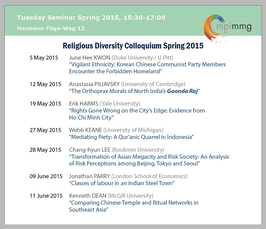"Penetrant Transnational Strategies of North Korean Migrants and the Liminalities of Korean National Identity"
Religious Diversity Colloquium Spring 2015
- Datum: 18.06.2015
- Uhrzeit: 15:30 - 17:00
- Vortragender: Byung-ho Chung (Hanyang University)
- Byung-Ho Chung, a native of South Korea, is the founding director of the Institute for Globalization and Multicultural Studies at Hanyang University. He earned an M.A. and Ph.D. in anthropology from Illinois in 1983 and 1992, respectively. Dr. Chung is being honored for his work on social activism and education reform extending throughout East Asia. The founder or co-founder of six civil society social justice organizations, he has focused particularly on the relationship between North and South Korea, promoting multiculturalism and peace and establishing organizations to care for refugees, many of them children. In 2014, he was awarded the Madhuri and Jagdish N. Sheth International Alumni Award for Exceptional Achievement from the University of Illinois Urbana-Champaign.
- Ort: MPI-MMG, Hermann-Föge-Weg 12, Göttingen
- Raum: Conference Room

For more details please contact vdvoffice(at)mmg.mpg.de.
North Koreans in South Korea have been seen as defectors, refugees, or migrants, and have also been the object of wariness and pity, as either heroes or victims. The government provides them with citizenship and special resettlement funds, but their adaptation to South Korean society is not easy. For fear of discrimination, most of them try to pass as South Koreans and live in largely invisible communities. Some North Korean migrants subsequently re-migrate to other countries in the West as refugees. A few even decide to return to North Korea. This paper investigates how North Korean migrants use transnational strategies to support their transnational families and to move up the social ladder as active subjects, not as passive objects. Due to their unique political characteristics, North Korean migrants actively engage in shadow transnational movements of people, goods, and information across borders. These acts of border crossing are interpreted in this study as „penetrant transnational strategies,“ actions that penetrate not only the political barriers of two Koreas but also the international borders beyond South Korea, but will also eventually induce socio-political changes in both sides of the migration. In so doing, they are challenging and transforming the Korean national identity based on the division system.